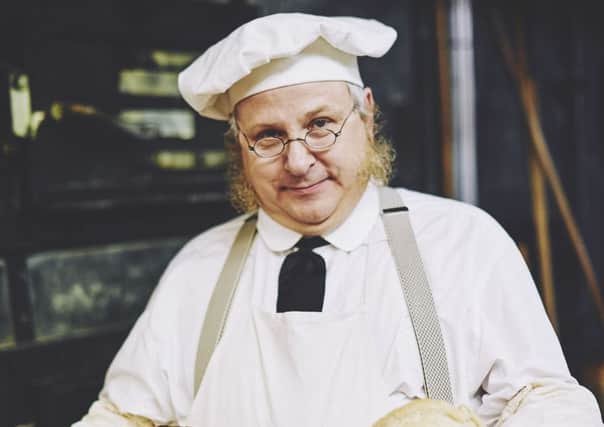Barnsley baker takes on the Victorians in new TV show


When Jon Foster saw an advert in a trade magazine for bakers to take part in an historical adventure he decided he knew the right woman for the job.
But when she was forced the pull out the producers for the BBC series asked John to step into her shoes.
Advertisement
Hide AdAdvertisement
Hide Ad“It wasn’t exactly what I planned,” said John who is managing director of Barnsley bakers Fosters which exports it frozen bread as far a field as China.
“I’ve always been interested in the history of baking and so I thought ‘Why not?’ But I really wasn’t prepared for how hard it was going to be.”
John is one of four modern bakers who were transported back in time for the BBC Two programme entitled ‘Victorian Bakers’ the first episode is aired on Tuesday at 8pm
The bakers spent four days in each of three locations using the methods and recipes of that particular period in time.
Advertisement
Hide AdAdvertisement
Hide Ad“It was exhausting,” says John. “All bakers work long hours but Victorian bakers had it particularly hard and they were obviously made of sterner stuff than modern bakers. We were working 18 or 19 hour shifts often through the night.”
After their shifts the bakers were taken to a nearby hotel but weren’t allowed to talk to each other or have any contact with the outside world.
“I think they would have had us sleep on site if they could.”
‘Victorian Bakers’ sees John and the three other bakers recreate the lives of their Victorian predecessors. It explores the social and economic change that took place. Using authentic methods and recipes from three distinct eras of the 19th century, they will bake their way through a turbulent period of huge change for Britain – one which forever changed our relationship with ‘our daily bread’.
Advertisement
Hide AdAdvertisement
Hide AdLeaving behind their modern tools, the bakers experience three very different worlds of Victorian baking – a rural bakery with close ties to local agriculture; the sweat and toil of an urban bakery in the midst of the industrial revolution; and the luxurious world of a high-class city baker-confectioner. Working in locations and using the engineering and technology of the day, the bakers will use only historic tools and ingredients.
The journey begins in 1837, when bread was the mainstay of most of our diets and bakers were at the heart of every community. A rural bake house was been kitted out exactly as it would have been in the 1830s. The bakers had to get to grips with centuries-old methods of bread making and that means doing absolutely everything by hand.
There are no shops, so the bakers deliver door-to-door. For industrial baker John the fixed demand and lack of competition enjoyed by Victorian bakers is an utter joy.
“The first episode is set in the most beautiful location near Peterborough, but it was really hard work.” However it was filming for the second episode which John found the most physically and emotionally demanding.
Advertisement
Hide AdAdvertisement
Hide Ad“The industrial revolution saw many bakers having to move into towns to make a living. We were filming in a bakery near Dudley which had two authentic coal fired ovens. I shovelled more coal than I did dough. It was a living hell,” recalls John as the four bakers experienced first-hand the exhaustion and squalid working conditions their forebears endured.
But the hardest part for John was when they were tasked with using the adulterants their forebears added to Britain’s bread and some start to question whether it’s safe to continue.
“Times were so hard for bakers whose lives were tragically short that they ended up putting adulterants such as chalk into the dough. I had a real problem with that. When I came home after filming my wife thought I was seriously ill and I felt terrible.”
However in the final episode the bakers move to London in the 1900s where they have become uniformed professionals supplying delicacies from a shop on the High Street.
Advertisement
Hide AdAdvertisement
Hide Ad“It was amazing to see how bakers had to change during that time and how changing technology affected their lives. I was fascinated to see that some of the methods I used when I was training were used in Victorian times.”
Experts were on hand to explore the wider context of baking, such as the changes in technology which saw watermills and windmills replaced by vast steam-driven processing plants, and how a few Victorian bakers went from small family businesses to brands still familiar today.
For John, whose business started out as a transport cafe set up by his grandmother, he has seen first had the way that bakers have had to adapt.
“It’s a case of evolve or don’t survive - it was the case back then and it’s still the case today,” says John who now employs more than 200 people at his Barnsley factory which supplies restaurants and business with bread across the globe.
Advertisement
Hide AdAdvertisement
Hide Ad“Just because you make the most of mechanisation and make things on a large scale doesn’t mean the quality isn’t there. We make upscaled artisan bread, but funnily enough demand abroad is for our sliced white and there is nothing wrong with that.”
John says taking part in the programme has had a lasting effect on him. “It has really made me appreciate the roll of the unions in getting fairer deals for miners at a very very hard time.”